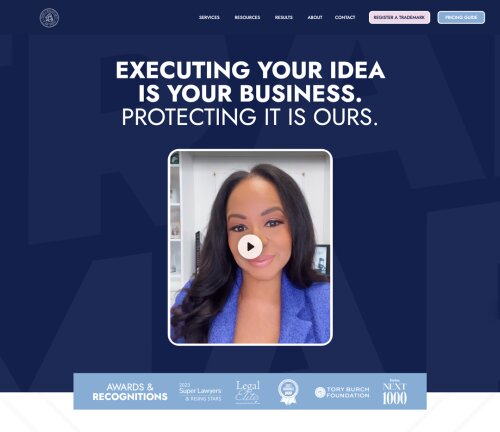Best Communications & Media Law Lawyers in North Carolina
Share your needs with us, get contacted by law firms.
Free. Takes 2 min.
Or refine your search by selecting a city:
List of the best lawyers in North Carolina, United States
About Communications & Media Law in North Carolina, United States
Communications and media law is a specialized area of legal practice that focuses on the regulation, rights, and responsibilities related to broadcasting, publishing, digital communications, and telecommunications. In North Carolina, this field encompasses a broad range of issues, including First Amendment protections, defamation, privacy concerns, access to public information, licensing requirements, and compliance with both federal and state regulations. With the rise of digital media platforms and evolving technologies, communications and media law continues to adapt to new challenges affecting individuals, journalists, businesses, and public entities across the state.
Why You May Need a Lawyer
Legal issues in communications and media can arise for a variety of reasons. Individuals and organizations may need legal advice or representation in the following situations:
- Facing allegations of defamation, libel, or slander stemming from published content
- Dealing with privacy violations or unauthorized use of images, audio, or video
- Needing guidance on compliance with federal and state broadcasting regulations
- Responding to subpoenas or court orders seeking confidential sources or unpublished materials
- Protecting intellectual property, trademarks, or copyrighted content
- Seeking access to public records and open meetings
- Handling disputes over advertising practices or digital marketing compliance
- Navigating licensing and ownership requirements for broadcasters and media companies
- Addressing social media or online harassment matters
- Responding to government inquiries or enforcement actions
If you find yourself in any similar situation or are unsure about your legal rights in media or communications, consulting a lawyer with experience in this area is highly recommended.
Local Laws Overview
North Carolina's laws related to communications and media are shaped by both state and federal statutes and court decisions. While federal law, including the First Amendment and regulations by bodies like the Federal Communications Commission (FCC), plays a significant role, several state-specific legal principles are important:
- Freedom of the Press and Speech: North Carolina upholds constitutional protections for freedom of expression while balancing them against privacy and defamation laws.
- Defamation Laws: State law differentiates between libel (written) and slander (spoken) and imposes specific requirements for proving harm and malice, especially for public figures.
- Shield Laws: North Carolina offers limited protections for journalists seeking to keep sources confidential, but these protections are not absolute.
- Access to Public Records: The North Carolina Public Records Law ensures that government documents are accessible to the public, with some exceptions for sensitive information.
- Broadcasting and Telecom Regulation: While largely governed by federal rules, North Carolina enforces additional registration and compliance requirements for certain communicators and service providers operating within the state.
- Commercial Speech and Advertising: The state has consumer protection laws that impact how businesses advertise and communicate with the public, particularly around truthfulness and disclosures.
- Privacy Protections: State laws address invasion of privacy, identity theft, and the unauthorized use of likeness or personal data in media content.
Understanding the intersection of federal and state law is crucial when dealing with communications and media-related legal matters in North Carolina.
Frequently Asked Questions
What is considered defamation under North Carolina law?
Defamation in North Carolina involves making a false statement about a person that harms their reputation. Libel refers to written or published statements, while slander refers to spoken statements. Plaintiffs must typically prove the statement was false, published to a third party, and harmful. Additional standards may apply if the person is a public figure or official.
Are there any protections for journalists and their confidential sources?
North Carolina provides a qualified shield law offering limited protection to journalists wishing to keep sources or unpublished information confidential. However, courts can compel disclosure if the information is essential to a legal case and cannot be obtained elsewhere.
How can I get access to public records in North Carolina?
Under the North Carolina Public Records Law, most government records are open to the public. Requests can be submitted to the relevant government agency. Exceptions exist for records related to sensitive information, ongoing investigations, or personal privacy.
What should I do if I receive a cease-and-desist letter regarding online content?
You should consult an attorney experienced in media or communications law before responding. They can assess the validity of the claim, advise on your rights, and help craft an appropriate response to avoid legal liability.
Can I use someone’s photo or likeness in my publication or marketing materials?
Generally, you must get the individual's consent to use their photo, voice, or likeness for commercial purposes. Using someone’s image without permission can lead to legal claims for invasion of privacy or misappropriation of likeness.
What regulations affect broadcasters in North Carolina?
Radio and television broadcasters must comply with federal FCC regulations, including licensing and content restrictions. Additional state regulations may apply concerning advertising, consumer protection, and certain types of content targeting North Carolina residents.
How are false advertising claims handled in North Carolina?
The North Carolina Unfair and Deceptive Trade Practices Act prohibits false or misleading advertising. Violations can result in civil penalties, lawsuits, and orders to change advertising practices.
Is cyberbullying or online harassment illegal in North Carolina?
Yes, North Carolina has laws addressing cyberbullying and online harassment, especially when directed at minors or involving threats. Victims can seek protective orders and law enforcement assistance in serious cases.
What should I do if someone is using my copyrighted work without permission?
You should document the unauthorized use and consult an attorney to discuss possible actions, such as sending a formal notice or pursuing a copyright infringement claim. North Carolina respects federal copyright law.
Can businesses be held liable for statements made by their employees on social media?
Businesses may be held liable for employees’ public statements if those statements are made within the scope of employment or are officially endorsed by the company. Employers are advised to have clear social media policies and provide training on appropriate online conduct.
Additional Resources
If you need help or information on communications and media law, consider contacting the following resources:
- North Carolina Bar Association - Communications Law Section
- North Carolina Press Association
- Federal Communications Commission (FCC) Regional Office
- North Carolina Attorney General’s Office - Consumer Protection Division
- State or Local Legal Aid Organizations for those who qualify
- University of North Carolina Center for Media Law and Policy
- Society of Professional Journalists - North Carolina Chapter
Next Steps
If you require legal assistance in communications and media law:
- Document all facts and keep copies of relevant correspondence, publications, or materials.
- Identify whether your issue involves defamation, privacy, copyright, advertising, or another area.
- Research potential attorneys with experience in media and communications law in North Carolina.
- Schedule a consultation to discuss your situation and objectives.
- Bring all relevant documents and a timeline of events to your initial meeting.
- Stay informed about deadlines, especially if responding to legal notices or requests.
Professional guidance can help you understand your rights, comply with relevant laws, and protect your personal, creative, or business interests in North Carolina.
Lawzana helps you find the best lawyers and law firms in North Carolina through a curated and pre-screened list of qualified legal professionals. Our platform offers rankings and detailed profiles of attorneys and law firms, allowing you to compare based on practice areas, including Communications & Media Law, experience, and client feedback.
Each profile includes a description of the firm's areas of practice, client reviews, team members and partners, year of establishment, spoken languages, office locations, contact information, social media presence, and any published articles or resources. Most firms on our platform speak English and are experienced in both local and international legal matters.
Get a quote from top-rated law firms in North Carolina, United States — quickly, securely, and without unnecessary hassle.
Disclaimer:
The information provided on this page is for general informational purposes only and does not constitute legal advice. While we strive to ensure the accuracy and relevance of the content, legal information may change over time, and interpretations of the law can vary. You should always consult with a qualified legal professional for advice specific to your situation.
We disclaim all liability for actions taken or not taken based on the content of this page. If you believe any information is incorrect or outdated, please contact us, and we will review and update it where appropriate.
Browse communications & media law law firms by city in North Carolina
Refine your search by selecting a city.












